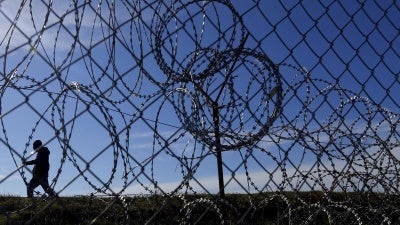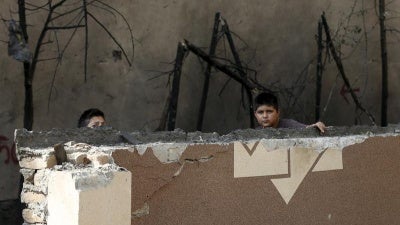
Europe’s Migration Crisis
Border closures and a March 2016 deal with Turkey led to a significant decline in arrivals of migrants and asylum seekers by sea to Greece compared to 2015, while boat migration from North Africa to Italy kept pace with previous years. By mid-September, over 290,000 people had made the crossing since the start of 2016, while more than 3,200 died or went missing in the attempt. European Union countries failed to take collective action to share responsibility equitably for asylum seekers or to create safe and legal channels to Europe.
Over 60 percent of those taking the dangerous journey originate from countries beset by war or generalized violence, or having repressive governments, such as Syria, Eritrea, Somalia, Afghanistan, and Iraq. The EU continues to emphasize preventing departures and combating smuggling over a coordinated approach based on access to protection and respect for human rights, including through problematic cooperation with Turkey and other transit countries.
The EU should sustain robust search-and-rescue operations in the Mediterranean and expand safe and legal channels into the EU. Increased direct resettlement from the countries bordering Syria, notably Lebanon, Jordan and Turkey, and other refugee-producing countries would benefit people seeking asylum and allow for better screening and vetting thereby protecting national security. EU countries should ensure more equitable responsibility sharing for asylum seekers, and implement common EU standards on reception conditions and asylum procedures.
- Europe/Central Asia
 Commentary
Commentary - Europe/Central Asia

 Dispatches
DispatchesWorld Refugee Summits Fail Refugees
Videos Watch More
News
-
 News Release
News ReleaseHungary: Failing to Protect Vulnerable Refugees
-
Commentary
Hungary’s War on Refugees
-

-
 News Release
News ReleaseProvide Genuine Refuge to World’s Displaced
-
 Dispatches
DispatchesHungary’s Xenophobic Anti-Migrant Campaign
-
Commentary
The tragedy of Greece's refugee children
-

-

-
 Dispatches
DispatchesThe Death of a Small Syrian Boy
-
-
-

-
 News Release
News ReleaseGreece: Migrant Children in Police Cells
-

-
 News Release
News ReleaseHungary: Migrants Abused at the Border
-
 News Release
News ReleaseEU/NATO: Europe’s Plan Endangers Foreigners in Libya
-
-
 News Release
News ReleaseItaly: Children Stuck in Unsafe Migrant Hotspot
-

-
 News Release
News ReleaseSweden: Restrictive Asylum Bill
-
-

-
 Dispatches
DispatchesDispatches: Deadly Week in the Mediterranean
-

-

-
 News Release
News ReleaseUN: Press Turkey to Open Border
-

-

-
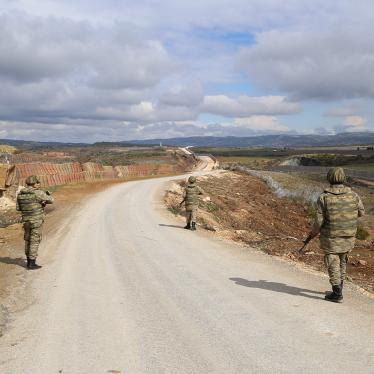
-

-

-
 Commentary
CommentaryOpen Hotspots Again
-

-

-

-
 News Release
News ReleaseEU: Asylum Proposals Go in Wrong Direction
-

-
 News Release
News ReleaseUN Meeting Ducks Syria Refugee Responsibility
-

-
 News Release
News ReleaseEU: Turkey Mass-Return Deal Threatens Rights
-
 News Release
News ReleaseEU/Turkey: Mass, Fast-Track Returns Threaten Rights
-

-
 News Release
News ReleaseEU/Turkey: Don’t Negotiate Away Refugee Rights
-
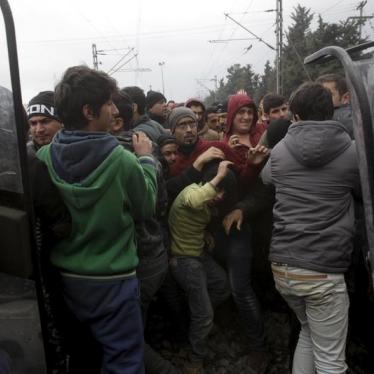 News Release
News ReleaseEU/Balkans/Greece: Border Curbs Threaten Rights
-

-

-

-
 Commentary
CommentaryFear and Loathing of Refugees in Europe
-
 News Release
News ReleaseNorway/Russia: Don’t Jeopardize Asylum Seekers
-

-
-
-
 News Release
News ReleaseEU/Greece: Share Responsibility for Asylum Seekers
-
 News Release
News ReleaseEuropean Union: Refugee Response Falls Short
-
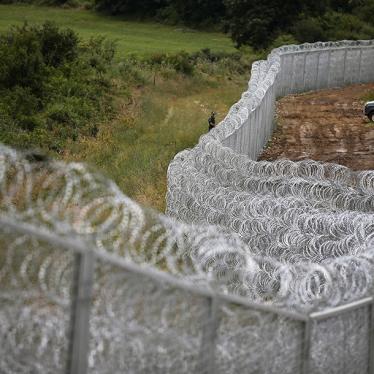
-

-
-
 News Release
News ReleaseMacedonia: New Move to Lock up Asylum Seekers
-

-

-

-

-
-

-

-

-

-
 News Release
News ReleaseAmid Insecurity, Protect Refugees
-
 News Release
News ReleaseEU: Steps to Address Refugee Crisis
-
 News Release
News ReleaseEU/AU: Put Rights at Heart of Migration Efforts
-

-
 News Release
News ReleaseTurkey: 400,000 Syrian Children Not in School
-

-

-

-
 News Release
News ReleaseEU/Balkans: Contradictory Migration Plan
-
 News Release
News ReleaseEU: Human Toll of Border Closures
-
Commentary
No, EU, Turkey Is Not Safe for Everyone
-

-

-

-

-

-

-

-

-

-

-

-
 News Release
News ReleaseEU: Leaders Duck Responsibilities on Refugees
-

-

-
 News Release
News ReleaseMacedonia: Unchecked Police Abuse of Migrants
-
 News Release
News ReleaseHungary: New Border Regime Threatens Asylum Seekers
-
 News Release
News ReleaseEU: Deflecting Responsibility to Protect Refugees
-
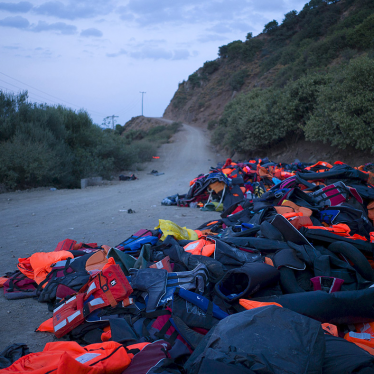 Dispatches
DispatchesDispatches: Let Refugees on Buses, Greece
-
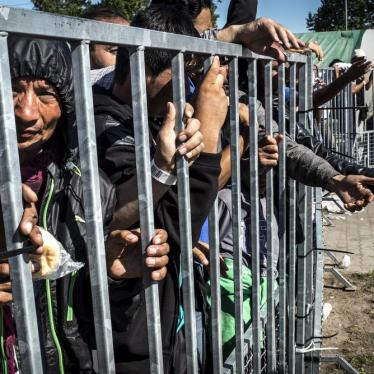 News Release
News ReleaseHungary: Abysmal Conditions in Border Detention
-
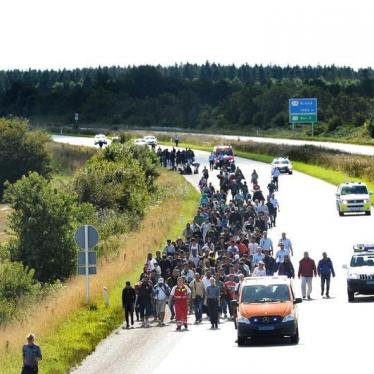 Commentary
CommentaryTime to Ditch ‘Dublin’
-

-
 Dispatches
DispatchesDispatches: Refugees March out of Hungary
-
 News Release
News ReleaseEU: Five Steps to Tackle Refugee Crisis
-

-
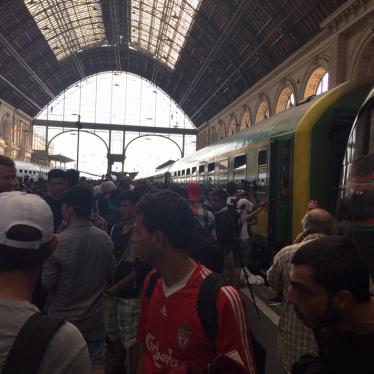
-
 Commentary
CommentaryThe Refugee Crisis That Isn't
-

-
-
 Commentary
CommentaryGrim crisis within EU borders
-

-

-

-
 News Release
News ReleaseMacedonia: Stop Police Violence Against Migrants
-
 Dispatches
DispatchesDispatches: ‘We Want to Live Like Humans’
-

-

-

-
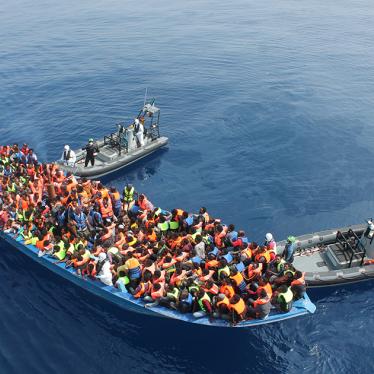
-

-

-

-

-

-

-

-

-
 Commentary
CommentaryMediterranean Crisis: The Big Haggle
-

-

-

-
 News Release
News ReleaseEU: Rights Abuses at Home Drive Mediterranean Crisis
-

-
 News Release
News ReleaseEU: Don’t Endanger Lives at Sea or Deny Protection
-

-
Commentary
Migrant smuggling: What are the EU options?
-
 Commentary
CommentaryBrussels’ Personae Non Gratae
-

-
 News Release
News ReleaseEU: Mixed Messages on Boat Migration
-

-
Commentary
Will Europe make migrant crisis worse?
-
 News Release
News ReleaseEU: Mediterranean Deaths Warrant Crisis Response
-
-
 News Release
News ReleaseEU: Intolerable Inaction Costs Lives at Sea
-
Reports More Reports
-

EU: Don’t Send Syrians Back to Turkey
Lack of Jobs, School, Health Care Spurs Poverty, Exploitation
-

Seeking Refuge
Unaccompanied Children in Sweden
-

Greece: Refugee “Hotspots” Unsafe, Unsanitary
Women, Children Fearful, Unprotected; Lack Basic Shelter

Finding Shelter
The world is in the midst of the worst refugee crisis since World War II. How did we get there? And what can be done to find the refugees a safe home?
Interactives More Interactives
-

Exodus: Asylum Seekers Flee Into Europe
“What will happen to us?” “Will they fingerprint us?” was the constant refrain as we watched a human wave of asylum seekers and migrants from Syria, Iraq, and Afghanistan crossing the Serbia-Hungary border.
-

Fleeing Syria and Stranded in Hungary
Interactive Photo Feature: Thousands of asylum-seekers, including many from war-torn Syria, arrive daily in Hungary, seeking a path to Germany and other Western European countries. Hungary has detained and at times refused to allow people to continue onwards to Western Europe, citing an EU regulation. As a result, thousands have been stranded at Budapest's Keleti train station. Human Rights Watch researchers interviewed scores. Here are their stories. >>

